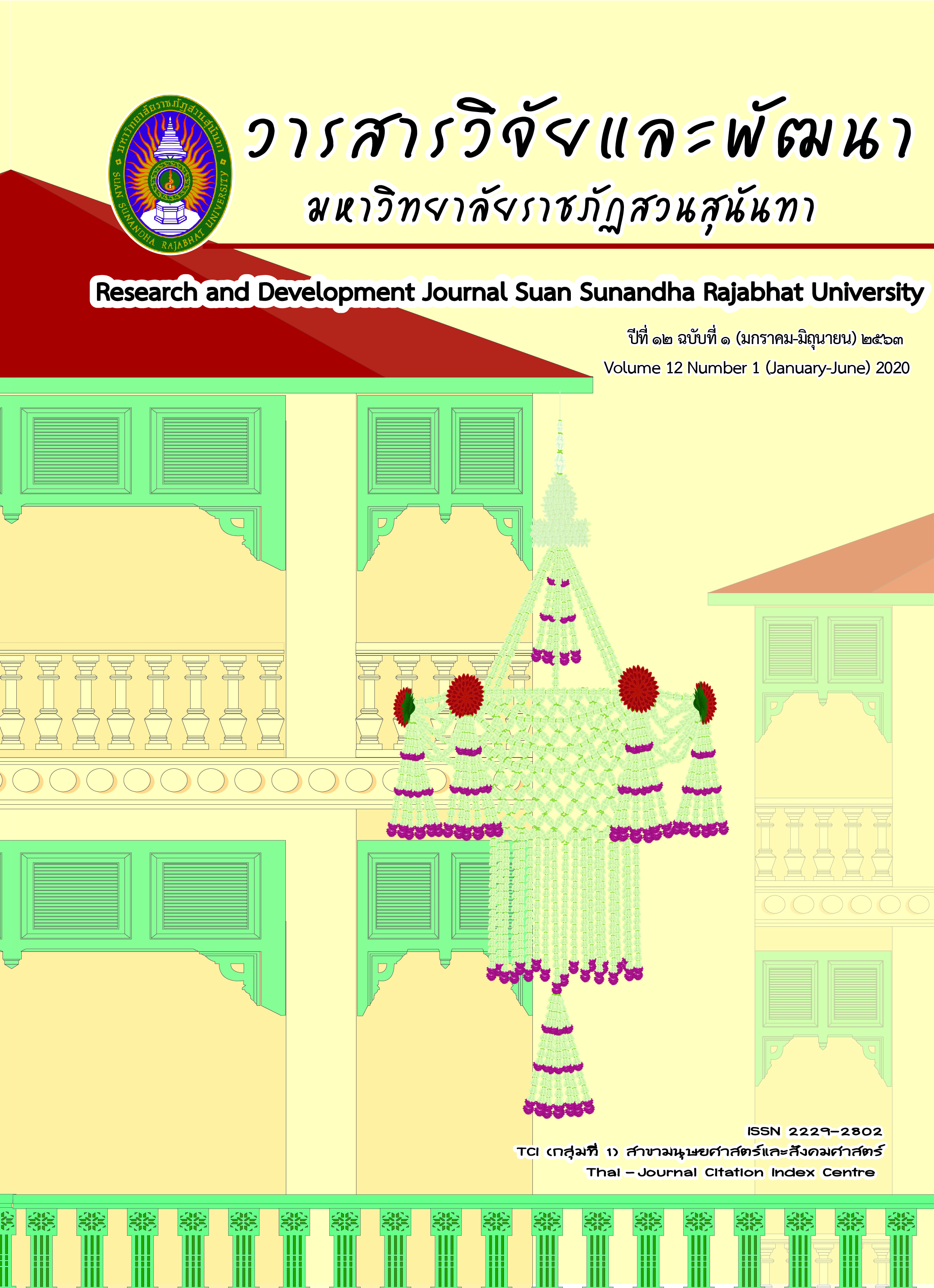แบบจำลองการวัดความสำเร็จในการดำเนินธุรกิจของอุตสาหกรรมชิ้นส่วนประกอบยานยนต์
คำสำคัญ:
แบบจำลอง, การวัดความสำเร็จ, อุตสาหกรรมชิ้นส่วนประกอบยานยนต์บทคัดย่อ
ในสภาวะการแข่งขันที่สูงมากของธุรกิจในปัจจุบัน และในแผนพัฒนาเศรษฐกิจและสังคมแห่งชาติฉบับที่ 12 การพัฒนาภาคอุตสาหกรรม และการปรับตัวเข้าสู่ยุคอุตสาหกรรม 4.0 ดังนั้นอุตสาหกรรมยานยนต์และชิ้นส่วนยานยนต์จำเป็นต้องให้ความสำคัญกับมาตรฐานและเทคโนโลยีการผลิตมากยิ่งขึ้น และนำนวัตกรรมเพื่อยกระดับการพัฒนาบริหารธุรกิจ อย่างไรก็ตามการดำเนินธุรกิจของอุตสาหกรรมผลิตชิ้นส่วนประกอบยานยนต์จะต้องเข้าใจถึงปัจจัยต่าง ๆ ที่มีผลต่อความสำเร็จในการดำเนินธุรกิจของอุตสาหกรรมผลิตชิ้นส่วนประกอบยานยนต์ การศึกษาครั้งนี้มีวัตถุประสงค์เพื่อ 1) ศึกษาระดับของภาวะผู้นำ การวางแผน การสนับสนุน การดำเนินงาน การประเมินประสิทธิภาพ การปรับปรุง และความสำเร็จในการดำเนินธุรกิจของอุตสาหกรรมผลิตชิ้นส่วนประกอบยานยนต์ 2) ศึกษาอิทธิพลของภาวะผู้นำ การวางแผน การสนับสนุน การดำเนินงาน การประเมินประสิทธิภาพ และการปรับปรุง ที่มีต่อความสำเร็จในการดำเนินธุรกิจของอุตสาหกรรมผลิตชิ้นส่วนประกอบยานยนต์ การวิจัยนี้เป็นการวิจัยเชิงผสมผสานระหว่างการวิจัยเชิงปริมาณและการวิจัยเชิงคุณภาพ ในการวิจัยเชิงปริมาณมีกลุ่มตัวอย่างคือผู้บริหารสถานประกอบการที่เป็นผู้ผลิตวัตถุดิบและชิ้นส่วนที่ส่งชิ้นส่วนให้กับโรงงานประกอบรถยนต์ในประเทศไทย จำนวน 600 คน ใช้หลักเกณฑ์อัตราส่วน 20 เท่า ของตัวแปรสังเกต ใช้วิธีการสุ่มตัวอย่างแบบชั้นภูมิ ใช้แบบสอบถามในการเก็บรวบรวมข้อมูล และการวิเคราะห์ข้อมูลโดยใช้สมการโครงสร้าง ส่วนการวิจัยเชิงคุณภาพใช้วิธีการสัมภาษณ์เชิงลึกผู้เชี่ยวชาญที่มีประสบการณ์ด้านวิชาการและการบริหาร ผู้บริหารจากโรงงานประกอบรถยนต์ ผู้บริหารจากโรงงานผลิตชิ้นส่วนประกอบยานยนต์ จำนวน 17 คน คัดเลือกแบบเฉพาะเจาะจง และวิเคราะห์ข้อมูลด้วยวิธีการวิเคราะห์เชิงเนื้อหา ผลการวิจัยพบว่า 1) ระดับของภาวะผู้นำ การวางแผน การสนับสนุน การดำเนินงาน การประเมิน และการปรับปรุง อยู่ในระดับมาก ส่วนความสำเร็จในการดำเนินธุรกิจ อยู่ในระดับปานกลาง 2) ภาวะผู้นำ การวางแผน การสนับสนุน การดำเนินงาน การประเมินประสิทธิภาพ และการปรับปรุง มีผลต่อความสำเร็จในการดำเนินธุรกิจของอุตสาหกรรมชิ้นส่วนประกอบยานยนต์ อย่างมีนัยสำคัญทางสถิติที่ระดับ .05 โดยทุกตัวแปรสามารถร่วมกันทำนายความสำเร็จในการดำเนินธุรกิจ ได้ร้อยละ 96 นอกจากนี้จากการวิจัยเชิงคุณภาพ พบว่า นวัตกรรมเชิงบริหารเป็นนวัตกรรมที่สามารถนำไปใช้ผ่านระบบการบริหารในการจัดการองค์กรจะทำให้ต้นทุนการผลิตรวมถึงกลยุทธ์ต่าง ๆ ที่นำมาใช้ในการปรับปรุงทำให้กระบวนการเกิดการทำงานที่สั้นที่สุด และเกิดประสิทธิภาพสูงสุด โดยมีการใช้หลักการบริหารเข้าไปควบคุมวิธีการต่าง ๆ การบริหารจัดการเทคโนโลยีการผลิตที่สมบูรณ์แบบในอนาคตจะต้องคำนึงถึงสังคม สิ่งแวดล้อมที่ดี เพื่อการพัฒนาปรับปรุงกระบวนการผลิตของชิ้นส่วนยานยนต์จากกระบวนการผลิตที่สะอาด ควบคุมปริมาณการปล่อยมลพิษเพื่อลดผลกระทบที่มีต่อมวลมนุษย์ในโลกนี้ เป็นการยกระดับการเป็นผู้ผลิตชิ้นส่วนยานยนต์ไทย นอกจากนี้ผู้ประกอบการการผลิตสามารถนำนวัตกรรมเชิงบริหารไปกำหนดแนวทางในการผลักดันให้เกิดผลผลิตหรือผลิตภัณฑ์ใหม่ที่ได้มาตรฐานและคุณภาพตามเกณฑ์มาตรฐานคุณภาพระดับสากล สร้างความได้ได้เปรียบเชิงศักยภาพในการแข่งขันอย่างมาก และมีศักยภาพการแข่งขันกับคู่แข่งในระดับสากล
เอกสารอ้างอิง
Dimitrios Maditinos Dimitrios Chatzoudes Lazaros Sarigiannidis, (2014), "Factors affecting e-business successful implementation", International Journal of Commerce and Management, Vol. 24 Issu 4 pp. 300 320
DZULINSKI, Ana Caroline. (2016). Multicriteria model of product development process for automotive supply chain based on the requirements of ISO TS 16949. 2016. 204 pages. Dissertation (Master’s Degree in Production Engeneering) – Federal Technological University of Paraná. Ponta Grossa, 2016.
F. R., Oprime, P.C., & Lizarelli, F. L. (2017). Impact analysis of critical success factors on the benefits from statistical process control implementation. Production,27,e20162040. http://dx.doi.org/10.1590/0103-6513.204016
Flamholtz, Eric (1974). Human Resource Accounting. Encino California: Dickenson Publishing.
Heskett, J. T. O. Jones, G. W. Loveman, W. Earl Sasser & L. A. Schlesinger. (1994). Putting the service-profit chain to work, Harvard Business Review, 72(2), 164-174.
HOJATALLAH MOUSAPOUR. (2014). ASSESSING MULTI-STAKEHOLDER APPROACH IN THE RELATIONSHIP BETWEEN ISO/TS16949 WITH ORGANIZATIONAL PERFORMANCE. Dissertation of Doctor of Philosophy (Management) Faculty of Management Universiti Teknologi Malaysia. (Online)
Jordi Canals, (2014). "Global leadership development, strategic alignment and CEOs commitment", Journal of Management Development, Vol. 33 Issue:5, pp.487-502, https://doi.org/10.1108/JMD-02-2014-0014.
Juliana Rossi Pereira Rocha, Mario Sergio Salerno, (2014). The role of APQP in product development: case studies on the assembler-suppliers relationship. Gest. Prod. vol.21 no.2 São Carlos April/June 2014.http://dx.doi.org/10.1590/0104-530X1139. (Online).
Kaplan R. S. & Norton, D. P. (1996). Using the Balanced Scorecard as a Strategy Management System. Harvard Business Review, Jan.-Feb. P. 75-85.
Kaplan R.S. & Norton D.P. (1992). The balanced scorecard-measures that drive performance, Harvard Business Review, 70, September-October: 79-79.
Kaplan R.S. and Norton D.P. (1996a). The Balanced Scorecard: Translating Strategy into Action. Harvard Business School Press, Boston.
Kaplan, R. S. & D.P. Norton (2006a). Alignment: Using the Balanced Scorecard to Create Corporate Synergies. Boston: HBS Press.
Kaplan, R. S. & D.P. Norton (2006b). How to Implement a New Strategy Without Disrupting.
L. Ganesh and Arpita Mehta. (2010). “Critical success factors for successful enterprise resource planning implementation at Indian SMEs”. International Journal of Business, Management and Social Sciences Vol. 1, No. 1, 2010, pp. 65-78
Motwani B (2016). Impact of Factors of Family Business on the Performance: A PLS-SEM Study. J Entrepren Organiz Manag 5: 183. doi:10.4172/2169-026X.1000183
Nazli Sadat Safavi, Nor Hidayati Zakaria, Mahyar Amini. (2014). The Risk Analysis of System Selection and Business Process Re-Engineering Towards the Success of Enterprise Resource Planning Project for Small and Medium Enterprise. World Applied Sciences Journal (WASJ), 2014.
Office of the National Economic and Social Development Board. (2017). The Twelfth National Economic and Social Development Plan (2017-2021).Bangkok. Retried from https://www.nesdb.go.th/nesdb_en/ewt_w3c/more_news.php?cid=230&filename=index
Omar Rabeea Mahdi, Erzan Shafizan Bin Gulam Mohd, Mahmoud Khalid Almsafir, (2014). Empirical Study on the Impact of Leadership Behavior on Organizational Commitment in Plantation Companies in Malaysia. Procedia - Social and Behavioral Sciences 109. (2014) 1076 – 1087. Available online at https://www.sciencedirect.com
OUTI SOIKKELI, (2017). Updating and Implementing Quality Management Systems according to ISO 9001:2015 and IATF 16949:2016 Standards. Tampere University of Technology Master of Science Thesis, 55 pages, May 2017. (Online)
Permata Wulandari, Wustari Mangundjaya, and Dharmayati B. Utoyo, (2015). Is job satisfaction a moderator or mediator on the relationship between change leadership and commitment to change?. Procedia - Social and Behavioral Sciences 172 ( 2015 ) 104 – 111. Available online at www.sciencedirect.com
Prakash Chandra Tunuguntla, Dr. Lakshmi Vishnu Murthy Tunuguntla, Vaishnavi Tunuguntla, (2014). Impact of Business Value Planning on Business-IT Alignment. Global Journal of Finance and Management. ISSN 0975-6477 Volume 6, Number 4 (2014), pp. 361-366 © Research India Publications http://www.ripublication.com
Renato Ribeiro Alves Tunes. (2018). Development of a Supplier Requirements Manual: A Case Study in the Automotive Industry. Master's thesis in Engineering and Industrial Management, guided by Professor Dr. Cristovão Silva and presented at the Department of Mechanical Engineering of the Faculty of Sciences and Technology of the University of Coimbra. (Online)
Richard McLean Jiju Antony, (2014),"Why continuous improvement initiatives fail in manufacturing environments? A systematic review of the evidence", International Journal of Productivity and Performance Management, Vol. 63 Iss 3 pp. 370 - 376 Permanent link to this document: http://dx.doi.org/10.1108/IJPPM-07-2013-0124
Pelin Arsezen-Otamis, Isil Arikan-Saltik,Sumeyra Babacan, (2015). The relationship between paternalistic leadership and business performance in small tourism businesses: The moderating role of affective organizational commitment. Procedia - Social and Behavioral Sciences 207 (2015) 90 – 97. Available online at https://www.sciencedirect.com
ดาวน์โหลด
เผยแพร่แล้ว
รูปแบบการอ้างอิง
ฉบับ
ประเภทบทความ
สัญญาอนุญาต
บทความที่ได้รับการตีพิมพ์เป็นลิขสิทธิ์ของ สถาบันวิจัยและพัฒนา มหาวิทยาลัยราชภัฎสวนสุนันทา
ข้อความที่ปรากฏในบทความแต่ละเรื่องในวารสารวิชาการเล่มนี้เป็นความคิดเห็นส่วนตัวของผู้เขียนแต่ละท่านไม่เกี่ยวข้องกับมหาวิทยาลัยราชภัฎสวนสุนันทา และคณาจารย์ท่านอื่นๆในมหาวิทยาลัยฯ แต่อย่างใด ความรับผิดชอบองค์ประกอบทั้งหมดของบทความแต่ละเรื่องเป็นของผู้เขียนแต่ละท่าน หากมีความผิดพลาดใดๆ ผู้เขียนแต่ละท่านจะรับผิดชอบบทความของตนเองแต่ผู้เดียว





